The Best Article Generators, tested in 7 Categories
TLDR: We wanted to find the best article generator but didn’t want to rely on anecdotal reviews. So, we did a series of data-backed tests to compare and rate the top tools to determine the best content generator once and for all.

| Tool | Content Quality (out of 5) | Uniqueness | How is Content Created? | Topic Coverage | Speed (words per second) | User Experience (out of 5) | Price |
|---|---|---|---|---|---|---|---|
| 1. Article Forge | 3.09 | 100% | AI/Deep Learning Models | 100% | 5.84 | 5 | $57/mo - unlimited articles |
| 2. AI Writer | 2.47 | 42.60% | Scraping & Spinning + AI/NLP | 77.8% | 4.85 | 4 | $49/mo - 120 articles |
| 3. Kontent Machine | 2.04 | 10.40% | Scraping & Spinning | 87% | 6.58 | 1 | $37/mo - unlimited articles |
| 4. SEO Content Machine | 1.56 | 0% | Scraping & Spinning | 68.5% | 3.20 | 1.5 | $27/mo - unlimited articles |
| 5. Articoolo | 1.05 | 14.30% | Scraping & Spinning | 50% | 4.76 | 2.5 | $99/mo - 250 articles |
Introduction
Article generators are tools that look to automate the content writing process by creating entire articles based on a keyword or topic. While in theory, these tools could save a huge amount of time and money, especially when used for SEO, the tools are only as good as their performance. So, we decided to run a series of tests to determine if any of the content generators out there are worth the investment.
How we set up the tests
We decided to judge each service by running tests and analyses on the following factors: content quality, uniqueness, how the tools create content, speed to return content, ease of use of the tool, topic coverage (can it write about any niche), and price.
For these tests, we picked 54 keywords ranging from long tail to short tail across many topic categories and niches and generated articles for each keyword with each tool.
We used the resulting articles to run tests and comparisons for each tool and have ranked their performance in each category below. The results of each test were combined to create the overall ranking of tools, best to worst.
Content Quality
Content quality is the most important thing to consider when deciding to use a tool to generate articles instead of writing or buying the content. However, it is also the most difficult factor to judge and quantify, which means that there is no simple test that can evaluate content quality. Instead, to make sure we were judging the content as accurately as possible, we decided to run a Mechanical Turk study on the overall quality of the articles produced by the tools.
This study had participants read articles and rate them on a 1-5 quality scale. They were told to base their ratings on: relevance to the given keyword, flow of the article, overall readability, syntax, factual accuracy, completeness of the article, etc. Multiple participants judged and rated each article to make sure we gathered enough data.
Quality rating results:
- Article Forge: 3.09/5
- AI-Writer: 2.47/5
- SEO Content Machine: 2.04/5
- Kontent Machine: 1.56/5
- Articoolo: 1.50/5
From our analysis, a score above 3.5 would be usable on a money site or tier 1 property with no revisions. A score in the 3-3.5 range would be usable as a blog post, on a tier 1 property, or on a money site with some revisions. A score between 2 and 3 would require significant revisions to even be useful as tier 1 or tier 2 content, and content rated below 2 would be unusable, even on a tier 2 property or as pbn content.
Uniqueness
To judge uniqueness, we ran the articles from each tool through CopyScape to determine if any articles came back with duplicate content and if so, how much.
Percentage of articles that are completely unique:
- 100% of Article Forge articles were completely unique
- 44.5% of AI Writer articles were completely unique
- 14.3% of Articoolo articles were completely unique
- 10.4% of Kontent Machine articles were completely unique
- 0% of SEO Content Machine articles were completely unique
Because so many of the articles came back with plagiarized content in other articles, we decided to illustrate the duplicate content data further. Below, the number of plagiarized articles per article per tool are broken down in pie charts.
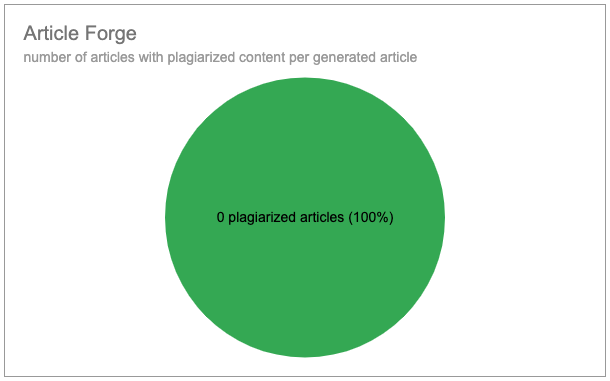
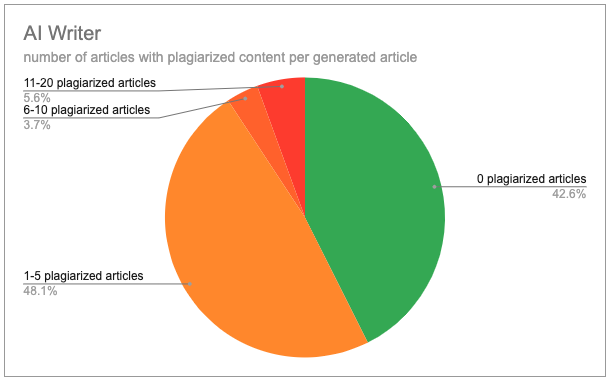
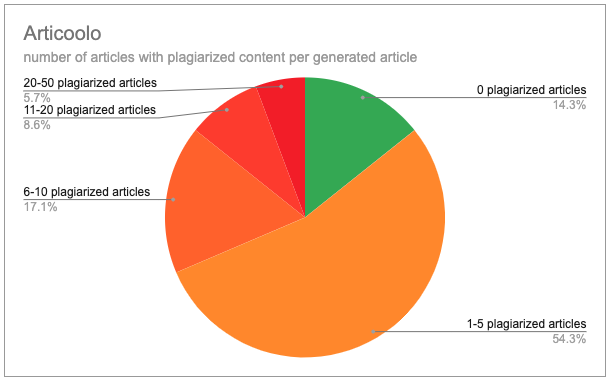
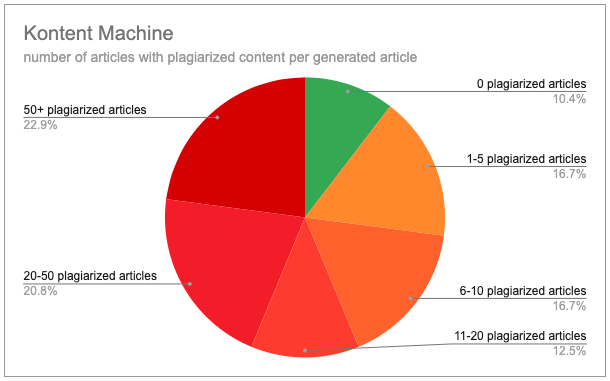
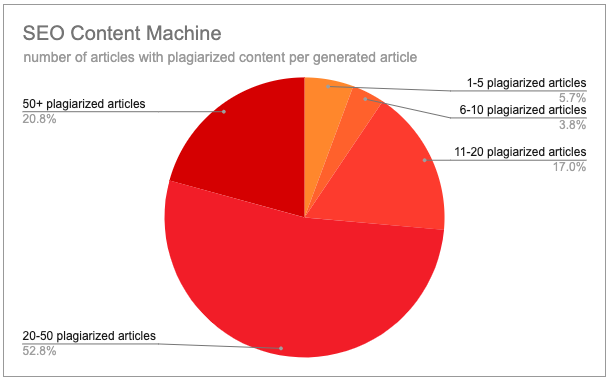
How the articles are made
In running the uniqueness tests, it became apparent that there was much more duplicate content than we would like or that Google would rank. This led us to ask the question of “how is the content being created?” Or more specifically, was the content really just scraped from other sources, patched together, and spun to make a “unique” article?
The scraping and spinning method of creating content automatically has been a blackhat tactic for years. If you are unfamiliar, it is the process of scraping (or programmatically taking) content from other sites and spinning it (changing or rearranging some of the words) to create “new” articles. Since 2011, Google has been vocally against duplicate content – especially content that is created by the scraping and spinning method – and will penalize sites that have too much duplicate content or are obviously using this method.
If you are reading over content and wondering if it was created using the scrape and spin method, there are a few tell tale signs to look for.
- The article seems to jump around from topic to topic between sentences.
- There are entire sentences that do not seem to fit with the flow of the article.
- There are sentences that appear to be randomly placed into the article (including names, places, etc that have not been previously mentioned or introduced).
- Sentences or phrases read very unnaturally.
Because this method is openly frowned upon by Google, it is unlikely that content created this way will rank, so we decided to look a bit further into each tool, and this is what we found:
1. Article Forge does not scrape and spin. Their site says they use deep learning models and AI to generate articles from scratch. Based on their AI claims, the fact that their content is completely unique, their content received the highest rating in the quality studies above, and the entire articles do not seem to have any of the above signs, it is safe to say that they are not using the scrape and spin method.
2. AI Writer claims to use AI to generate content. However, there is still a very high likelihood that there is scraping and spinning involved because AI Writer provides the URLs it gets content from, there are random sentences with unexplained names, and that some of the sentences are patched together. Overall, it is pretty apparent that it uses the scrape and spin method. However, they seem to be doing at least some natural language processing (NLP) or AI to group the scraped content in a logical order and improve the readability beyond the raw sentences.
3. Articoolo uses the scrape and spin method – while their site does not say it outright, the fact that they say their technology finds the best base resources and extracts the important content, then rewrites the text to form an article is essentially a softer way of saying they scrape the content then spin it to create the article. In addition, many of the above signs are apparent in the articles.
5. SEO Content Machine and Kontent Machine do not try to hide the fact that they are scraping and spinning content – it is a core part of the setup process. SEO Content Machine asks you how many URLs you would like to scrape per article while Kontent Machine requires you to provide your own proxies for scraping and gives you a choice of which spinner you want to use.
Topic coverage
Topic coverage is extremely important – these automatic content creation tools are only useful if they can actually write about your specific keywords. So, to judge this, we calculated the percentage of time each tool was able to return a result about the keyword it was given.
Percentage of time each tool was able to return an article for the keyword provided:
- AI Writer and Article Forge both returned articles for 100% of keywords.
- SEO Content Machine returned articles for 98.1% of keywords.
- Kontent Machine returned articles for 88.9% of keywords.
- Articoolo returned articles for 64.8% of keywords.
The above paints a decent picture about which tools can write about any topic but we wanted to make sure the successfully returned articles were actually written about the keyword.
Percentage of articles that mentioned the keyword at least once:
- Article Forge: 100%
- Kontent Machine: 97.9%
- AI Writer: 77.8%
- Articoolo: 77.1%
- SEO Content Machine: 69.8%
Overall percentage of the time the tools returned an article that contained the keyword
- Article Forge: 100%
- Kontent Machine: 87%
- AI Writer: 77.8%
- SEO Content Machine: 68.5%
- Articoolo: 50%
Speed
To determine the speed of each of the tools, we timed how long it took to set up the articles plus how long it took for the tool to generate our articles. When given the option, we tested the longest article lengths (generally between 500 and 800 words, depending on the tool) knowing that shorter articles would take less time. Note: SEO Content Machine and Article Forge both allow for bulk processing, so we were able to paste in all keywords at one time, which made the processes much simpler and faster. However, for the purpose of the test, we also generated the articles one by one in those tools to keep the comparisons equal.
Average time to return an article:
- Kontent Machine: 1 minute 11 seconds
- Articoolo: 1 minute 37 seconds
- Article Forge: 2 minutes 2 seconds
- Ai Writer 2 minutes 52 seconds
- SEO Content Machine 3 minutes 29 seconds
The tools did output different length articles so to make sure tools that produced longer articles were not given an unfair disadvantage, we also broke down the speed per word written.
Average words generated per second:
- Kontent Machine: 6.58 words per second
- Article Forge: 5.84 words per second
- Ai Writer: 4.85 words per second
- Articoolo: 4.76 words per second
- SEO Content machine: 3.20 words per second
From these two breakdowns, we can see that Kontent Machine was the fastest tool. But it is important to note that Kontent Machine takes a while to download and set up initially and requires you to provide your own proxies. This means the overall speed of Kontent Machine depends heavily on the quality and speed of the proxies.
In addition, while Articoolo was the second-fastest to return articles, it wrote fewer words overall which is made apparent by the second breakdown. It is also important to note that some keywords required multiple attempts to generate articles when using Articoolo and even then many articles failed to return any article after multiple tries. As mentioned above, retries were not timed when calculating speed because technically, that would be considered attempting to generate multiple articles at that point.
User experience
This category is very difficult to quantify because it depends entirely on the feel of the tool. So, we are judging this category on how easy it is to get the hang of, defining features, and the overall user experience of each tool.
Overall user experience rating:
- Article Forge: 5/5
- AI Writer: 4/5
- Articoolo: 2.5/5
- SEO Content Machine: 1.5/5
- Kontent Machine: 1/5
1. Article Forge – Article Forge ranks number one in user experience because it has an intuitive web-based interface that is extremely simple to use while also including features that give you control over your articles. The most noteworthy takeaways include:
- No setup time, you can create your first article immediately
- Ability to enter main keywords and sub-keywords (you can give the tool more information about what you are looking for)
- Ability to control article length
- Ability to automatically add images, videos, and links/anchor text
- You can create multiple articles at a time with the bulk article generator
- You can generate content in 7 languages
- Simple file manager, can download multiple articles at a time
2. AI Writer places second because it also has an easy to use web-interface. However, AI Writer does not allow for nearly as much control as Article Forge (you cannot select article length, or add titles, images, videos, or links) and you have to create articles one at a time. The below takeaways place it above the remaining tools:
- No set up time, you can create your first article immediately
- You can enter up to 65 characters to describe your topic
- Includes URLs for most of the sites it scrapes.
- Simple file manager (however, you have to download files individually)
3. Articoolo is ranked third, because they offer an extremely simple web-based interface but there are consistent issues getting articles. Here are the major takeaways:
- Extremely simple interface (you can enter 2-5 keywords)
- You have to select from their keyword options to start generating the article
- Many articles fail – it often takes multiple attempts to generate one article
- Can generate content in six languages
- Simple file manager (however, you have to download files individually)
4. SEO Content Machine places fourth because you have to download the content generation software in order to run it but it does work on both Mac OS and Windows. The main takeaways for SEO Content Machine are:
- Download required (does work on Mac OS and Windows)
- Lengthy installation/setup process, steep learning curve (not much guidance)
- You have to set up and use “Captcha Credits” to create articles
- You can select the number of paragraphs per article
- You can create multiple paragraph variations per article
- You can queue multiple articles at a time with their article creator
5. Kontent Machine ranks last because you have to download the software and only Windows is supported. In addition, you have to configure a lot of settings to get the tool up and running. Here are the main takeaways:
- Download required (only supports Windows)
- Lengthy installation/setup process, steep learning curve (there are setup guides)
- You have to provide your own proxies for scraping content
- Campaigns are easily repeatable once they have been set up
- Articles can automatically be saved to files on your computer
Price
Each of the tools have different plan options ranging from one-time purchases to subscription plans that include unlimited usage. In general, pay per use plans are more expensive per article than subscription plans (even subscription plans that have usage limits). In addition, the plans with article limits decrease the price per article as the quantity increases. We understand that not everyone needs the same number of articles per month, so we listed price breakdowns for two different content need tiers.
Price if you need approximately 250+ articles per month:
- SEO Content Machine: $27/mo or $120/year for unlimited articles
- Kontent Machine: $37/mo for unlimited articles
- Article Forge: $57/month $324/year for unlimited articles
- AI Writer: $95/mo for 250 articles (you have to contact their support to get this rate, it is not advertised publicly)
- Articoolo: $99/month for 250 articles
Price if you only need 50 articles per month:
- SEO Content Machine: $27/mo or $120/year for unlimited articles
- Kontent Machine: $37/mo for unlimited articles
- AI-Writer: $49/mo for 120 articles (you have to contact their support to get this rate, it is not advertised publicly)
- Articoolo: $49/month for 100 articles
- Article Forge: $57/month $324/year for unlimited articles
It is important to note that some of the content tools have more plans than are listed above and you can find more information about pricing for these tools by clicking the tool names above.
Overall Grade and Takeaways
| Tool | Content Quality (out of 5) | Uniqueness | How is Content Created? | Topic Coverage | Speed (words per second) | User Experience (out of 5) | Price |
|---|---|---|---|---|---|---|---|
| 1. Article Forge | 3.09 | 100% | AI/Deep Learning Models | 100% | 5.84 | 5 | $57/mo - unlimited articles |
| 2. AI Writer | 2.47 | 42.60% | Scraping & Spinning + AI/NLP | 77.8% | 4.85 | 4 | $49/mo - 120 articles |
| 3. Kontent Machine | 2.04 | 10.40% | Scraping & Spinning | 87% | 6.58 | 1 | $37/mo - unlimited articles |
| 4. SEO Content Machine | 1.56 | 0% | Scraping & Spinning | 68.5% | 3.20 | 1.5 | $27/mo - unlimited articles |
| 5. Articoolo | 1.05 | 14.30% | Scraping & Spinning | 50% | 4.76 | 2.5 | $99/mo - 250 articles |
Article Forge is the clear winner because while it was not the fastest or cheapest tool, it vastly outperformed the other article tools in the quality studies, the uniqueness tests, the coverage tests, and the user experience analysis. It is also the only tool that is not using the “scraping and spinning” method to generate content. If waiting an extra minute and paying an extra $20/month is the difference between getting penalized and rewarded by Google, Article Forge is definitely worth the time and money.
In terms of quality and uniqueness, there was also quite a large gap between Article Forge and the next best tool: AI Writer. The most defining takeaway from these tests is that Article Forge is using some sort of AI and deep learning models to create content instead of the “scrape and spin” methods that the rest of the tools are using. This is likely responsible for the higher quality content, the complete uniqueness/lack of duplicate content and the coverage of all types of topics.
These factors definitely justify the price of Article Forge above the cheaper tools and while no tool creates perfect content, Article Forge content is the closest to human written content. For these reasons, we are going to be using Article Forge for our SEO content needs and definitely recommend it over all other tools in the space.
Thank you for taking the time to read our post, we hope you found the tests we ran useful. Feel free to leave any comments or questions about the post below, we would be happy to discuss!

